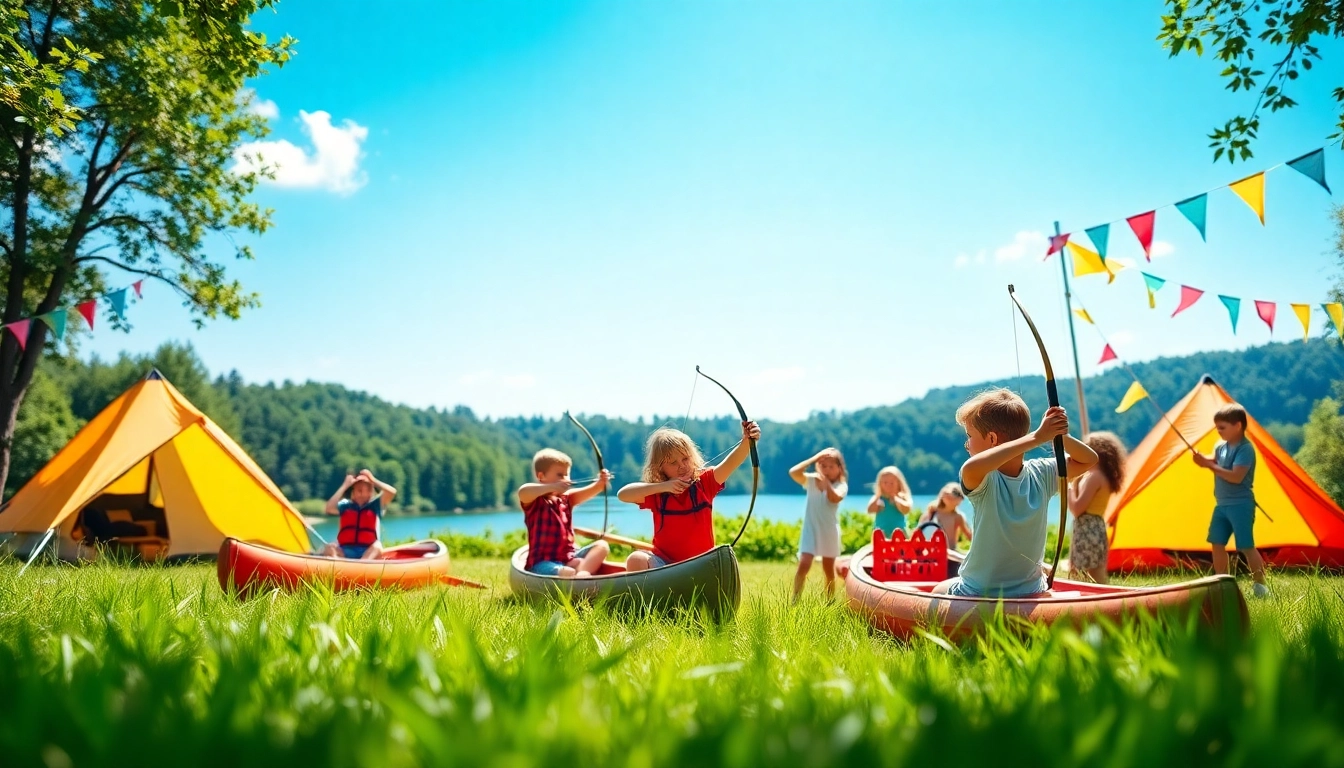Understanding Holiday Camps: What Are They?
Holiday camps are immersive, often themed retreats designed for individuals—primarily children and teens—to engage in constructive, fun-filled activities during school breaks. They provide a unique environment where participants can explore new interests, build social skills, and create lasting memories. Various types of camps cater to diverse interests, offering everything from sports-focused camps to arts and crafts. For those looking for well-organized holiday camps, it’s essential to understand the scope and benefits they provide.
Definition and Types of Holiday Camps
At their core, holiday camps serve as structured settings that foster personal growth and development among participants. Here are some common types of holiday camps:
- Sports Camps: Focused on athletic development, these camps improve physical skills while fostering teamwork and sportsmanship.
- Arts and Crafts Camps: Emphasizing creativity, these camps enable participants to express themselves through various artistic mediums.
- Adventure Camps: Often set in natural environments, these camps involve outdoor activities like hiking, climbing, and kayaking, promoting a sense of adventure.
- Educational Camps: Aimed at enhancing academic skills, these camps often include workshops, tutoring, and collaborative learning experiences.
- Specialty Camps: Covering niche interests, these camps may focus on technology, drama, or cookery, catering to specific passions.
Benefits of Attending Holiday Camps
Participating in holiday camps offers a multitude of benefits:
- Social Skills Development: Camps create opportunities for kids to meet peers, make friends, and develop communication skills.
- Boost in Confidence: Engaging in new activities can naturally enhance self-esteem as campers master skills and face challenges.
- Learning Opportunities: Camps help children learn outside the classroom, fostering curiosity and a love for learning.
- Physical Activity: Many camps integrate outdoor and physical activities that promote healthy lifestyles.
- Independence: Away from home, kids learn to make decisions, manage time, and care for themselves in a supervised but independent manner.
Who Can Attend Holiday Camps?
While holiday camps traditionally target children and teenagers, they can be adapted for various age groups, including:
- Children (Ages 6-12): Most camps cater to this age range, providing age-appropriate activities.
- Teens (Ages 13-18): Some camps focus specifically on teenagers, offering leadership training, advanced skills, and community service opportunities.
- Families: Some holiday camps also offer family-inclusive experiences, allowing parents and guardians to participate alongside their children.
Popular Activities at Holiday Camps
Holiday camps feature an array of activities that cater to different interests and ages. Below, we explore some of the most popular activities found in these settings:
Outdoor Adventures: Fun in Nature
Outdoor adventures are a staple of many holiday camps, encouraging campers to connect with nature and develop physical skills:
- Hiking: Nature trails offer a chance to explore local ecosystems while promoting physical fitness.
- Canoeing/Kayaking: Water activities teach essential water safety skills and teamwork.
- Rock Climbing: Many camps have climbing walls or access to natural rock formations, helping campers build strength and confidence.
Creative Workshops: Arts and Crafts
Encouraging creativity, arts and crafts workshops allow campers to explore their artistic talents. Popular activities include:
- Painting and Drawing: Campers can experiment with different styles and mediums.
- Craft Projects: Activities such as pottery, beading, or woodworking enhance fine motor skills and creativity.
- Performing Arts: Drama and music workshops encourage self-expression and confidence.
Sports and Team Activities: Building Skills
Moreover, sports and team-building activities teach critical life skills and promote physical fitness:
- Team Sports: Activities like soccer, basketball, and volleyball foster teamwork and strategic thinking.
- Individual Sports: Archery, swimming, and tennis enhance personal achievements and focus.
- Games and Competitions: Friendly competitions promote sportsmanship and make for a fun camp environment.
Choosing the Right Holiday Camps
Finding the right holiday camp for your child involves careful consideration of several factors. Here’s a guide to facilitate your decision-making:
Factors to Consider When Selecting Camps
Start by outlining the essential criteria for selecting a camp:
- Location: Proximity to your home or a safe travel route should be a priority.
- Type of Activities: Select camps that align with your child’s interests and personality.
- Duration: Consider how long you want your child to attend, whether for a day, a week, or the entire summer.
- Cost: Evaluate your budget against the benefits and amenities provided by the camp.
- Staff Qualifications: Research the staff’s experience and background to ensure safety and professionalism.
Comparing Local Holiday Camps
Once you have a list of potential camps, it’s time to compare them:
- Visit Camp Websites: Review the detailed information about the camp’s philosophy, facilities, and activities.
- Talk to Other Parents: Word-of-mouth recommendations can provide valuable insights into the camp’s reputation.
- Attend Open Houses: Many camps hold open houses or information sessions that allow you and your child to engage with staff and tour the facilities.
How to Evaluate Camp Reviews
Assessing online reviews can be helpful, but it’s essential to approach them critically:
- Look for Consistency: Multiple reviews stating similar experiences often provide a more accurate picture of the camp.
- Evaluate the Balance: Consider both positive and negative feedback; an abundance of extreme reviews may indicate a strong bias.
- Trust Your Instincts: If something feels off based on reviews, dig deeper or consider alternatives.
Preparing for Your Holiday Camps Experience
Preparation ensures that your child’s experience at holiday camps is positive and stress-free:
Packing Essentials for Campers
Help your child pack appropriately for their camp experience:
- Clothing: Pack comfortable and weather-appropriate outfits, including swimwear, extra layers, and sturdy shoes.
- Toiletries: Include sunscreen, insect repellent, a toothbrush, and other personal hygiene items.
- Items from Home: A favorite comfort item, like a stuffed animal or blanket, can ease homesickness.
What to Discuss with Children Before Camp
Prior conversations can set the tone for a successful camp experience:
- Expectations: Talk about what they can look forward to and address any concerns.
- Independence: Prepare your child for new responsibilities and the freedom to make decisions.
- Friendship: Discuss how to engage with others, including making new friends and dealing with conflicts.
Understanding Camp Policies and Safety Measures
It’s crucial to review the camp’s policies regarding health and safety:
- Health Protocols: Understand guidelines on vaccinations, health screenings, and emergency procedures.
- Staff-to-Camper Ratio: Ensure that the camp adheres to safe supervision standards.
- Safety Policies: Inquire into how the camp handles safety concerns and emergency situations.
Maximizing Fun and Learning at Holiday Camps
To get the most out of holiday camps, consider these strategies:
Encouraging Social Interaction Among Campers
Fostering an environment that encourages social interactions can enhance the camping experience:
- Participate in Group Activities: Encourage your child to join team-based activities or games.
- Be Open to New Friendships: Discuss the importance of connecting with others and being approachable.
- Support Cooperative Learning: Emphasize the value of teamwork and collaboration in all activities.
Setting Goals for Camp Experiences
Having clear objectives can help your child focus and derive greater satisfaction from their time at camp:
- Personal Growth Goals: Set achievable targets for social interactions, skill development, or artistic exploration.
- Skill Mastery: Encourage campers to identify specific skills they wish to improve during their stay.
- Reflection: After camp, ask your child to reflect on their achievements and experiences, reinforcing growth and development.
Post-Camp Activities to Continue the Journey
After camp, it’s essential to keep the momentum going:
- Group Reunions: Consider organizing reunions with fellow campers to maintain friendships.
- Encourage Continued Interests: Supply opportunities for your child to continue with newfound hobbies or skills.
- Family Discussions: Regularly check in with your child about their experiences and learning outcomes.



